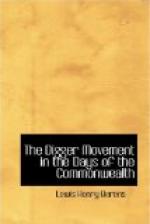[197:2] “Things of this world,” says Locke (Of Civil Government, part ii. chap. xiii. sec. 157), “are in so constant a flux, that nothing remains long in the same state.... But ... private interest often keeps up customs and privileges when the reasons of them are ceased.”
[200:1] In his great work Of Civil Government, John Locke takes practically the same view as Winstanley of the duties of Parliaments and of the function of Law. In chapter ix. (part ii.) he says: “The legislative or supreme power of any Commonwealth, is bound to govern by established standing laws, promulgated and known to the people, and not by extemporary decrees; by indifferent [impartial] and upright judges, who are to decide controversies by those laws; and to employ the force of the community at home, only in the execution of such laws, or abroad, to prevent or redress foreign injuries, and secure the community from inroads and invasion. And all this to be directed to no other end, but the peace, safety, and public good of the people.” Italics are ours.
CHAPTER XVI
GERRARD WINSTANLEY’S UTOPIA
THE LAW OF FREEDOM (concluded)
“Day unto day utters
speech—
Be wise, O ye Nations! and hear
What yesterday telleth to-day,
What to-day to the morrow will preach.
A change cometh over our sphere,
And the old goeth down to decay.
A new light hath dawned on the darkness of yore,
And men shall be slaves and oppressors no more.”
CHARLES
MACKAY.
It is in the chapter we have just been considering, the fourth chapter of “The Law of Freedom,” that we find Winstanley’s last recorded utterances on cosmological and theological problems. Nothing seems to us more strikingly to show the broadening and development of his powerful mind than a comparison of the views here expressed with those contained in his earlier writings on the subject. True, the underlying ideas are practically the same: he still realises the existence of a Divine Spirit, the Spirit of Reason and of Love, of Righteousness and of Peace, animating, inspiring, pervading and governing the whole Creation; he still holds to his doctrine of the Inward Light, the spark of the Divine Spirit of Reason, within man, prompting each and all to act righteously and equitably one toward the other. Yet he is decidedly less mystical. He lays emphasis on the necessity to study the works of God rather than the Word of God; and has evidently become less anthropomorphic and more spiritual, less mystical and more rational, less religious and more ethical, less theological and more philosophic, less scholastic and more scientific. However, we had better let him speak for himself. Immediately after his reflections on the duties and functions of a Commonwealth’s Parliament, he proceeds to consider the work of a Commonwealth’s Ministry, as follows:




